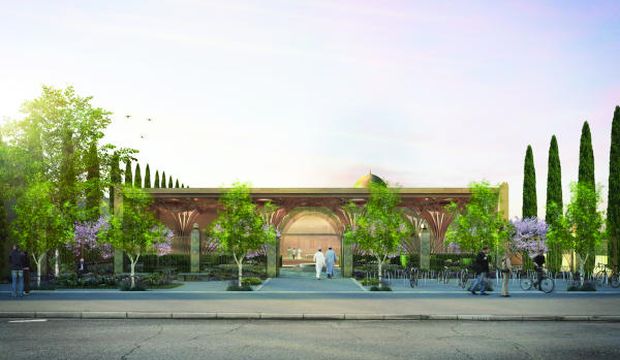Khan came to Cambridge to study political science, but was diagnosed with advanced lung cancer shortly after graduating. This did not, however, affect her resolve, nor her busy extra-curricular schedule, which was part of the inspiration for the mosque.
“Since starting my studies at Cambridge University, I have been very affected by the Muslim student community here, getting involved in activities to let people know about our faith. [Muslim] students here gathered regularly to perform group prayers and to undertake religious classes and recite the Qur’an in a small, crowded room that was converted into a makeshift mosque. This is where the idea came from to build a new, spacious mosque capable of holding all these worshipers,” she said.
The Cambridge Mosque, which will hold 1,000 worshipers, will be almost entirely reliant on green energy, with “an almost-zero carbon footprint.” The mosque building will be naturally lit all year round using large skylights integrated into the building’s design, and it will boast a green roof as well as an air-source heat pump for regulating temperature.
“Islam is in dire need at the moment of improving its image, particularly in the West, to help dissociate it from the accusations of violence and terrorism,” says Khan. “I think encouraging the building of ecologically friendly structures and taking care of the environment could help here in a very positive way.”
The man who will design the building is award-winning architect Marks Barfield, who is also responsible for the iconic London Eye. He says he is aiming to merge traditional Islamic architectural motifs with those of the European Gothic style in order to bring the two cultures together under one roof—or dome.
Professor Keith Critchlow, an expert on Islamic architecture and sacred art from the Prince’s School of Traditional Arts—founded by the Prince of Wales—has also been recruited to work on a number of designs for the project.
The prime mover behind the project is the Cambridge-based Muslim Academic Trust, which started a campaign with Khan’s help to raise money for the mosque after submitting the building plans to the local council, which approved them in 2012.
The Trust’s chairman and founder and leader of the Cambridge Mosque project is the British Islamic scholar Professor Timothy Winter, also known as Shaykh Abdal Hakim Murad. He told Asharq Al-Awsat: “We expect the project to cost around 18 million British pounds [29 million US dollars]. We’ve been able to so far raise around 6.2 million pounds [10 million dollars],” adding that the project relied heavily on donations, with “over 7,000 people helping so far, most whom are from Hong Kong and Indonesia.”
The latest official figures estimate the Muslim population in Cambridge at around 2,500–4,000, meaning there is a dire need for more space for religious services. Speaking to Asharq Al-Awsat, Sajad Makik, the imam of Cambridge’s only existing mosque, the Abu Bakr, said: “The [new] Cambridge Mosque will hold a large number of worshipers, which will relieve pressure on the other, small prayer areas [in the city].”
“At the moment we can’t host all the worshipers who come to the small [Abu Bakr] Mosque. The rows of worshipers spill out onto the street, which slows down traffic. During religious occasions such as Eid, we have to resort to switching the location of the mosque to a sports field in order to accommodate the numbers, which go over 2,000 on such occasions,” he said.
“The Cambridge Mosque will be the first to be built in the city for worship, and it will be open to all, Muslim and non-Muslim alike,” added Makik.
“We are aiming, through the building of the mosque, to improve the local area and to help make it more beautiful. We have decided to build two parks as well for this very purpose, the first will surround the mosque and will be open to all, with the second inside the mosque and reserved for worshipers and their children.”

